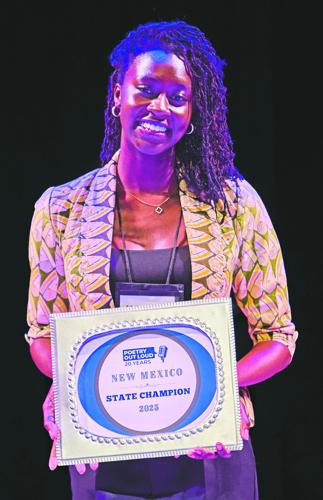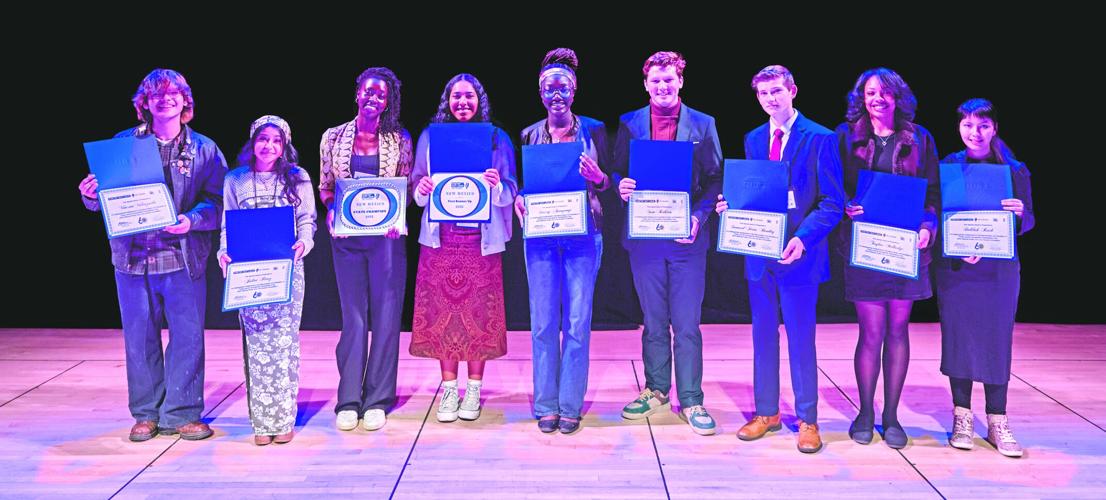Kaitlyn Lubega’s two years in New Mexico have left quite an impression on the soon-to-graduate senior, while the United World College-USA student has reciprocally left her mark on the Land of Enchantment.
Lubega will represent the state during the Poetry Out Loud National Finals on May 5-7 in Washington, D.C., after winning the New Mexico finals in mid-March at the Lensic Performing Arts Center. It was Lubega’s second victory in two tries in the state competition. The state and national finals events are sandwiched around April, which is National Poetry Month.
Lubega’s family lives in New Jersey, and she was born in the United Kingdom before moving to the U.S. Her mother grew up in Uganda, and many of the lessons her mother taught her about being a woman have informed how Lubega carries herself in contemporary America. She came to Montezuma as a junior, a big change for a teenager accustomed to the East Coast.
Poetry Out Loud marks its 20th anniversary this year, and judged competitions are held in every state, as well as several territories. Participants recite works others have created; Lubega also writes her own poetry. The New Mexico competition stems from a partnership among the National Endowment for the Arts, the Poetry Foundation, and New Mexico Arts. As the state final winner, Lubega receives $200, and United World College-USA receives a $500 stipend to buy poetry materials. The national winner receives a $20,000 cash award.
The boarding school is in Montezuma, a town about 5 miles northwest of Las Vegas with roughly 500 residents, many of them students. Lubega graduates May 22 and will attend Connecticut College in the fall. She and Kate Ribeiro, a faculty member who serves as Lubega’s mentor, recently chatted with Pasatiempo about how New Mexico has helped shape Lubega, her creative process, what it’s like to represent a state in the nation’s capital, and how other creative pursuits evolved into creating poetry.
Lubega was in especially good spirits, as the interview coincidentally occurred on her 18th birthday. Answers have been edited for length and clarity.
What does it feel like on stage and to be told, while among your peers, that you have won?
Lubega: I’ve been an athlete for a large part of my life, and it’s sort of the same feeling of when you’re about to start a race, except it’s the end of “the race” in this situation. It’s nerve-wracking but also very rewarding; my mom has always told me growing up, “No matter what the outcome is, hold yourself with the same sort of dignity and poise regardless.” When I’m in those positions, especially like a few weeks ago, when I was standing on the stage, I [think], whatever happens, happens.
You’ve got a good idea what to expect at the national competition after attending last year. What struck you about that experience?
Lubega: Last year, we got to the semifinal round, and I was looking at everybody. They were a bunch of diverse-looking, beautiful people. They organized us in our state order. I don’t know if I could say I felt more nervous or more like an imposter. Everybody else came from these bigger states with a lot more competitors. [Lubega bested eight fellow New Mexico students in the competition here.] I was talking to people who said they’d had a two-day competition for just their state. I was like, “OK, well, I don’t belong here. These people have gone through a lot more rounds and [met] a lot more criteria.”
But once you’re about to walk on the stage, the feeling is the same. I find it so exhilarating. At the same time, it’s in D.C.; there are more people, and the stage is bigger. It feels a lot more professional, and I definitely did feel a lot more like an imposter. In the same sense, it’s empowering being on a bigger stage, because you’re around other people, and the talent [level] is obviously a lot higher.
Imposter syndrome can strike creators at any age, in any discipline. How do you combat it?
Lubega: I think it’s just reminding myself that I am there for a reason. [When you perform], you are going to do your best, and somebody thought you did deserve it; you have been placed there for a reason. I tell myself, “Even if you don’t believe, you can slowly start to believe, if you just keep doing it.” A lot of people feel that imposter syndrome — the best of the best. I don’t think it’s something that anybody can ever shake, because we do view ourselves as some small individual in a sea of many.
Kate Ribeiro is your mentor at United World College-USA. Who are some other mentors who’ve helped shape you?
Lubega: I’ve had some strong female figures in my life, [especially] my mom and my aunt. I am a tall Ugandan woman; I walk with my head [held high]. When I was younger, every day before I went to school, my mom would tell me, “Do your best, look your best, and be your best every single day.” My aunt supports me heavily in these things, and she’s coming to the [national] competition again this year. She’s such a unique and powerful individual, and she has such a presence. I’ve tried to take the things that I love from the strong women that I’ve seen in my life as I’ve gotten older. It’s not overconfidence, but just surety in yourself. My mom has ingrained in me to not let anybody shake your surety, because if you don’t have it, nobody else [has it in you].
What has inspired you while in New Mexico?
Lubega: At this school, I’ve written the most poetry in my whole life, and I think it’s because I’m around so many different experiences and individuals. This school is so diverse, [with] diverse perspectives, diverse people, diverse minds. That has given me more inspiration. And when I go out in the world, in beautiful [large] cities, or even Las Vegas, New Mexico, you see all these people who are different to me, because obviously it’s a new area for me. I look around, and everybody has individual, unique, and beautiful experiences. That realization sparks a lot of curiosity in me.
When did you start writing poetry?
Lubega: Only recently. I wrote music when I was younger — another one of my creative pursuits. I love singing. I love dancing.
How do you plan to keep poetry part of your life following graduation?
Lubega: I definitely see myself competing in slam poetry when I’m older and still participating in poetry-recitation competitions. I want my writing to get to a level where I’m confident enough to share it, because I’ve always loved reading other people’s poetry and having it resonate with me. I definitely would love to be able to write on a larger scale, and hopefully be able to make a book or something like that. But just yesterday, I was watching Amanda Gorman’s [2021] inauguration poem [The Hill We Climb] again, because I love a recitation. I don’t think that it’s my main goal in life, but it’s definitely something I don’t ever want to stop doing, because it brings me so much joy and excitement.
You’ve played basketball and soccer, run track, and swum at previous schools. Do creative competitions and athletic competitions have anything in common?
Lubega: There are a lot of similarities between sports and the arts, in performance and mental aspects. A similarity between completing a sporting event and [a poem] is, I feel like I could have done so much more. I look at some of the poems I write, and a day later I’m like, Why did I do that? I could have written this differently. I could have added a different line. With sports, it’s like, I could have made that basket.
What is your student-adviser relationship like?
Ribeiro: We meet at least every other week, but on this small campus, we see each other pretty regularly. Last year, I traveled with Kaitlyn to the [Poetry Out Loud National Finals] in Washington, D.C.
I understand what she’s talking about with imposter syndrome, but as somebody who has seen her perform, it’s incredible to watch her on stage. I’ve been teaching for 30 years, and it’s so rare to see somebody with the control and poise that Kaitlyn has.
How has living in New Mexico during formative years of your life changed you?
Lubega: I’ve grown so much. A lot of the people who come to our school want to come here so badly, and some apply many times. Personally, I didn’t want to come here. My parents were the ones pushing for me to apply. Coming here, I had some disdain toward leaving home, but I ultimately became a person I didn’t even see myself becoming.
I’ll take [away] a love for nature. I was never big on hiking. I go on walks here, and it’s beautiful. I’ll definitely miss the landscape here. I’ll take so many lessons that I heard earlier in life, and finally could apply them [here]. I’ll forever cherish this place in New Mexico for everything it has done for me.









